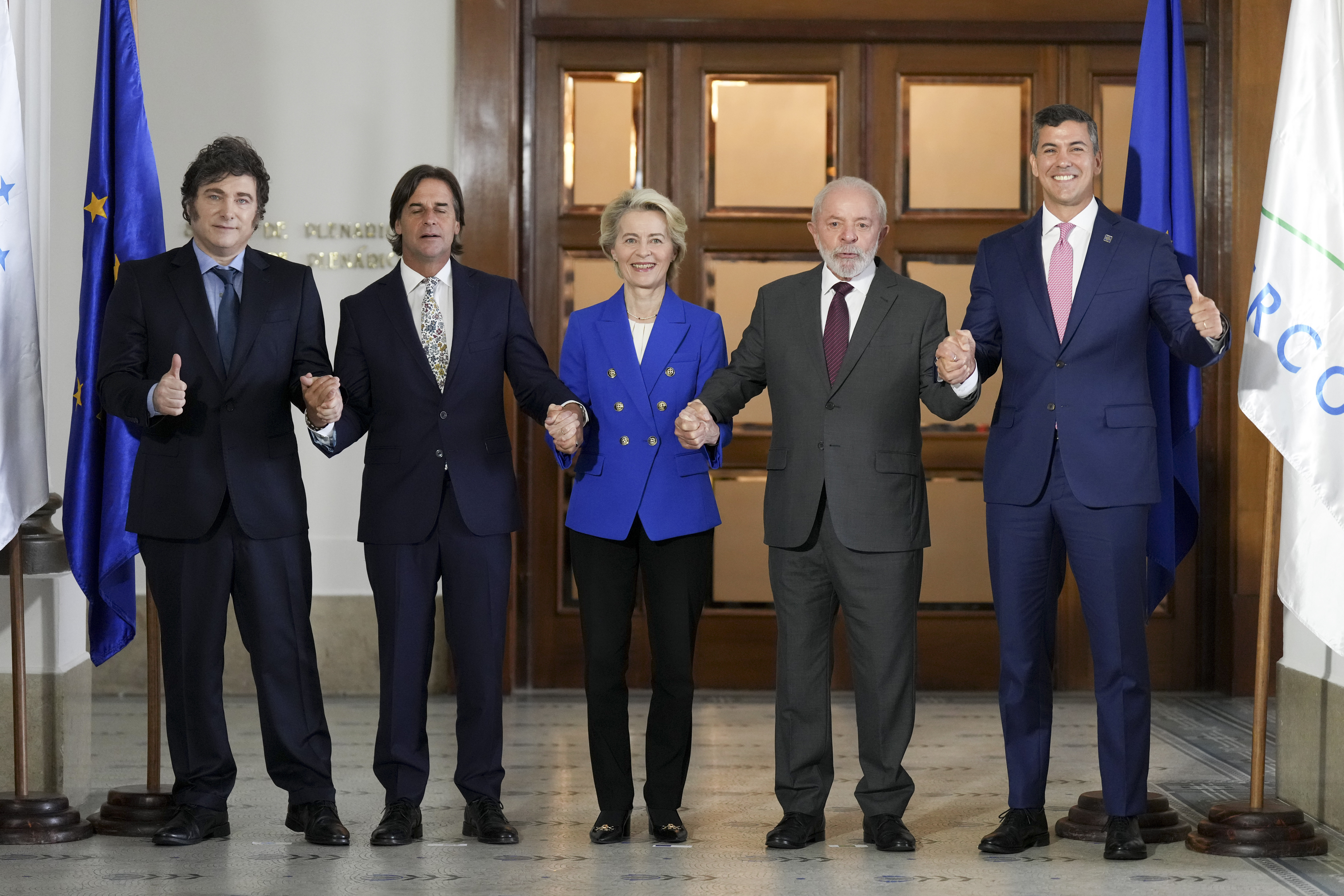EU-Mercosur Agreement
Strong sign for free trade from Montevideo, but still too early for champagne corks

From left: Argentina's President Javier Milei, Uruguay President Luis Lacalle Pou, European Commission President Ursula von der Leyen, Brazil's President Luiz Inacio Lula da Silva and Paraguay's President Santiago Pena pose for a picture during the Mercosur Summit in Montevideo, Uruguay.
© picture alliance / ASSOCIATED PRESS | Matilde CampodonicoAnyone traveling to Montevideo for the first time will be struck by the relative manageability and tranquillity of Uruguay's capital - especially in comparison to the hectic metropolises of its two large neighbors in the north and south of the country, Brazil and Argentina. Politically, Uruguay is also a haven of stability and democracy, making it a role model far beyond the region. This became clear once again during the presidential elections at the end of November, where the handover from the previous head of state Luis Alberto Lacalle Pou, who was popular both inside and outside the country and was unable to run again, to his successor Yamandú Orsi, who will take office next March, is proceeding quietly and harmoniously.
Change of Government in a Stable Democracy: Yamandú Orsi Becomes the New President of Uruguay

On November 24, the almost 3.5 million inhabitants of Uruguay elected Yamandú Orsi as president of the country in the second round of voting. Uruguay, a beacon of democratic stability in the region, is an impressive special case in view of the increasing polarization at regional and global level.
Uruguay is also doing quite well economically this year, with expected GDP growth of around 3% and an inflation rate of around 5% (on an annualized basis, mind you!), largely thanks to an economic policy based on free trade and foreign investment.
We know this from the EU: it was often the smaller member states that provided important impetus for further regional integration: Luxembourg, Belgium, the Netherlands, precisely because they had a balancing effect between their larger neighbors.
Uruguay seized the opportunity as host
As Mercosur's smallest member state, Uruguay has now seized this opportunity to achieve an important, perhaps even the most important milestone in the finalization of the EU-Mercosur agreement, which has been under negotiation for over 25 years. Uruguay is not only the seat of the Mercosur Parliament, but also currently holds the rotating presidency of the Mercosur Group. Thanks to his high reputation and negotiating skills, President Luis Alberto Lacalle Pou was able to successfully negotiate the last outstanding points (particularly on environmental requirements, agricultural quotas and transition periods) within the EU-Mercosur agreement. He proved to be a neutral broker between the presidents of Brazil and Argentina, Lula da Silva and Javier Milei, whose personal animosity was again evident at the G20 summit in Rio de Janeiro at the end of November.
In addition, Luis Alberto Lacalle Pou and his negotiating team succeeded in the last few weeks and months in quietly and productively clearing the last obstacles to the agreement with the EU delegation led by the experienced chief negotiator Rupert Schlegelmilch to such an extent that European Commission President Ursula von der Leyen ultimately decided to travel to Montevideo. This was open until the very end, partly due to the last few meters still to be covered in the negotiations, partly due to the transitional period in the EU Commission, as the new Commissioners have only just started office, but finally also due to the difficult domestic political situation in France following the forced resignation of Prime Minister Michel Barnier last week due to a lack of support in Parliament.
On St. Nicholas Day, Luis Alberto Lacalle Pou and Ursula von der Leyen were finally able to announce the breakthrough in the EU-Mercosur agreement in Montevideo, framed by the presidents of Brazil, Argentina and Paraguay.
Largest free trade zone in the world could emerge
The EU-Mercosur agreement will create the largest free trade zone in the world, with 750 million inhabitants. Customs duties on over 90% of goods and services will be gradually abolished in both blocs, resulting in billions of euros in savings and more business opportunities for companies and consumers - albeit with long transition periods of up to 18 years in some cases. The European Commission estimates the cost savings for European exporters alone at 4 billion euros per year.
The criticism voiced by the European agricultural industry against the agreement is greatly exaggerated. On the one hand, this concerns the fear of a mountain of new meat imports and wine lakes to Europe. In Austria, for example, South American imports account for just 3% of total meat consumption. The agreement is expected to result in an additional 125 grams per capita being imported into Europe - a small steak per year. Furthermore, European suppliers are by no means without a chance against the South American competition: quality and the increasing trend towards buying regional, high-quality products will continue to find their market in the future. Fears that South American meat producers do not comply with European environmental and health standards are also unfounded. For one thing, the relevant European laws naturally also apply to imported goods. On the other hand, it is astonishing that European tourists enjoy meat specialties and a glass of Malbec (or Tannat in Uruguay) in Argentinian steakhouses and Brazilian rodizios with enthusiasm and completely without hesitation and then apparently have to be protected from these imports to Europe. This is reminiscent of the chlorinated chicken saga that caused the TTIP agreement with the USA to fail last decade, with fatal consequences for the European economy, especially in view of Trump's re-election. Such a debacle must not be allowed to happen again.
In view of the media-effective images of vehement protests by farmers in Paris and Brussels against the EU-Mercosur agreement, it is obvious but short-sighted to discuss only its impact on one sector. Even in France, agriculture accounts for just 2% of GDP, far below its perceived importance for France's national culture and identity.
(Manageable) more competition in agriculture is offset by considerable opportunities for European industry as a result of the agreement. This also applies in particular to the important topic of "green reindustrialization" for Brazil, but also for the other Mercosur countries. Due to the great potential for hydrogen and renewable energies, Brazil offers excellent conditions for investment and production, especially in energy-intensive industries. Added to this is the availability of rare earths, such as lithium, and copper, both of which are important raw materials for alternative engine technologies in the energy transition. This offers new export and investment opportunities in the Mercosur countries not only for German industry, but also for French industry, with its traditional strength in the energy sector.
Next steps are crucial
The EU-Mercosur agreement has now been finally negotiated. However, there are still crucial stages to be completed in both regional alliances before it can enter into force. In each of the Mercosur countries, the national parliaments must give their approval. Neither Lula nor Milei have their own majorities in the parliaments of their countries and are therefore dependent on forming majorities, in some cases with groups that are less free trade-oriented. In comparison, the upcoming political change in Uruguay should not be a major obstacle, especially as the political establishment - as in Paraguay - has been strongly in favor of the agreement for years.
In the EU, the European Parliament and the European Council must approve the trade policy parts. For the - additional - political parts, unanimity in the Council and ratification by the national parliaments would even be required, which is considered to be unrealistic. The pro-European MEPs do have a majority in Parliament. However, due to the rejection by President Macron's "Renaissance" party and the critical stance of the European Greens, persuasion is also required here. This applies even more to the European Council, where four countries could already form a blocking minority if they make up at least 35% of the EU population. French President Macron has already rejected the agreement as "unacceptable" in a first sharp reaction after the summit in Montevideo. Poland is also currently expected to reject the agreement. Austria and the Netherlands have also expressed criticism. Italy's position could play a key role.
It is to be hoped that the supporters of the agreement will campaign strongly at national and international level in the coming months for a successful conclusion. This applies in particular to Europe, which should see Latin America and above all the Mercosur countries as an opportunity for important political allies with a common western-oriented, liberal understanding of values and economically for a stronger diversification of procurement and sales markets.
Don't miss the opportunity
At the same time, Germany and Europe need Latin America more than the other way around in an age of geopolitical and economic systemic competition, which has been intensified by Trump's re-election. All four Mercosur countries have long had their "Plans B" on their desks should the EU-Mercosur agreement fail after all and are considering intensifying their economic relations with China in this case. Brazil as a BRICS founding state and presidency in 2025 anyway. But this even applies to Argentina's President Milei, who otherwise fights socialism all over the world, recently described China as a "very interesting trading partner" and will travel to China to visit President Xi at the beginning of next year.
While Ursula von der Leyen was on her way home to Europe with the happiness of the negotiated agreement in her luggage, Milei also announced in Montevideo what he really dreams of: a free trade agreement between Argentina and the USA - MAGA squared, so to speak. He called on Mercosur to finally release him from the "prison" that free trade agreements can only be negotiated at Mercosur level.
It is therefore all the more important that the EU does not fail itself again in its attempt to create the world's largest free trade area.
